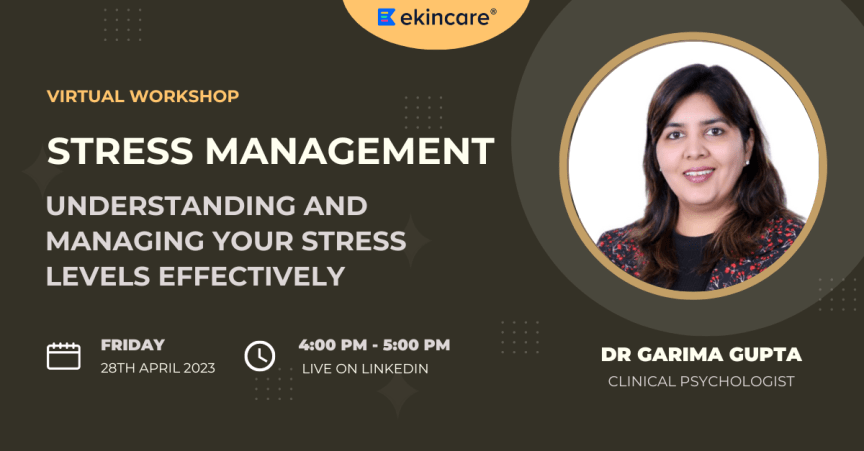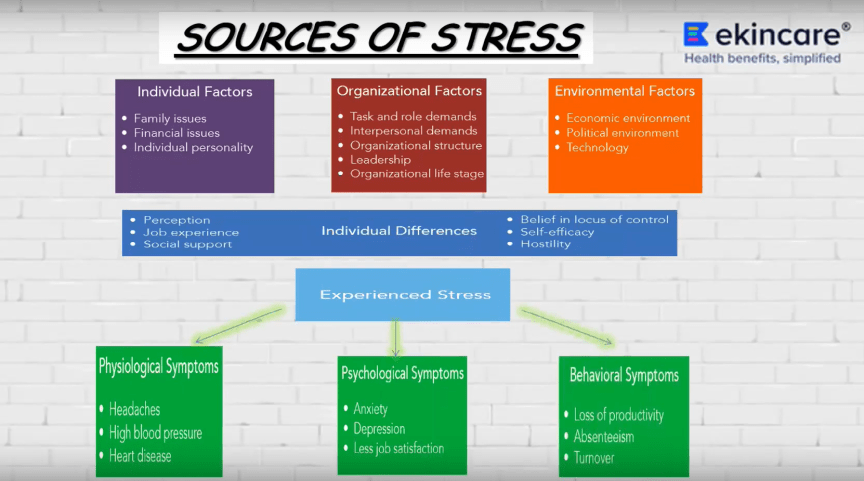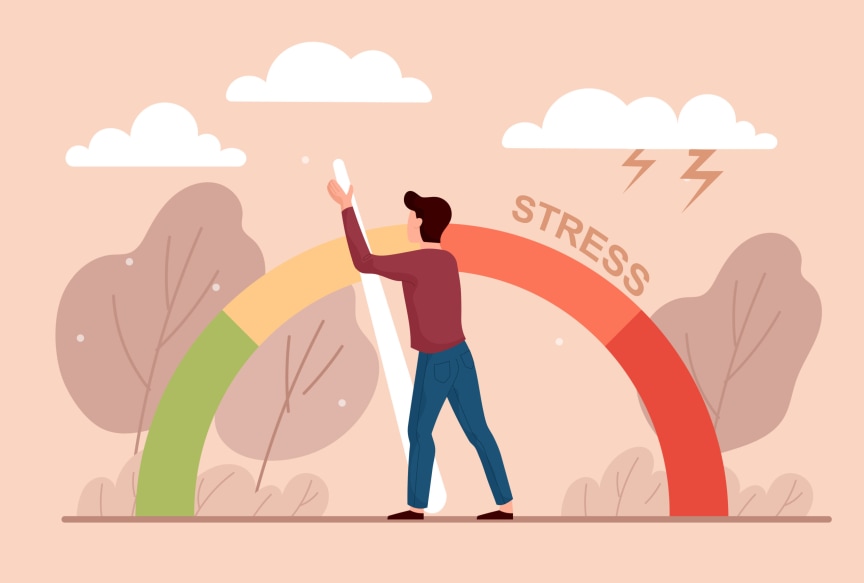Learn why leading HR professionals trust ekincare! Explore Now

Do you feel better all the time, or do you have trouble sleeping more than one night a week?
Is your answer yes or no?
Do you have a hard time relaxing or feel unable to relax often?
Is your answer yes or no?
Do you forget things often?
Is your answer yes or no?
Are you frequently angry and tired at the end of the day?
Do you often feel under pressure?
Is it a yes or no?
Do you often argue, even about minor things?
Do you feel like you never have time for yourself?
Do you find yourself not wanting to socialize with adults?
Do you lack patience with others and feel like they are often wrong about things?
Do others tell you that you seem tense or upset?
So, how many questions did you answer with a yes? If you answered yes to two or more of these questions and feel this way regularly, chances are that you are stressed.
Now, let's define what stress is. Stress is the nonspecific response of the body to any demand for change. Stress can be defined as physical or mental tension caused by a difficult situation in life. Stress is a natural human response that prompts us to address challenges and threats in our lives. It's important to note that everyone experiences stress to some degree, so it's not something new to any of us in this world.
If the stress is in the first zone that is under stimulation, that is okay. That is not stress. That means the effect of the stress is low, and the stress intensity is low. Moderate and short-term stress is called eustress. Short-term stress is manageable and controllable. But if the intensity of the stress is high over a period of time, we get high and chronic stress, also known as distress. Distress decreases performance, while eustress or positive stress improves performance. Some amount of stress is required in our daily life to motivate us and act as eustress. Distress is beyond our resources to cope with that trait, and eustress stimulates and motivates us to tackle challenges.
Stress can demotivate us, while eustress provides us with a burst of energy. Distress exhausts us, lays out all our energy, and is within our coping abilities. It does not necessarily improve energy levels in our day-to-day functioning. Eustress, on the other hand, is basically functioning and provides us with nutrients because we are motivated to finish our tasks and reduce stress. Distress causes anxiety, depression, and other mental health problems, while eustress empowers us to grow physically, emotionally, and psychologically.
Stress is an inevitable part of life, and there are various sources of stress that can accumulate and lead to physiological, psychological, and behavioural symptoms. These sources of stress can be categorized into individual factors, organizational factors, environmental factors, and individual differences.

Individual factors include family issues, financial issues, and personality traits. Financial stress, such as the inability to make ends meet or unexpected new demands on a person's cash flow, can be a major issue that disturbs an employee's time at work. Family stress, such as divorces, ailing parents, or children, can also create stressful situations that an employee carries with them to work, affecting their performance and well-being.
Organizational factors include tasks and goals, organizational structure, leadership, and organizational life stage. A stressful task might be a detailed presentation to senior management, while a stressful role in the mind might involve being expected to achieve more in a set amount of time than is realistically possible. Interpersonal elements, such as ongoing conflict with coworkers or a lack of social support, can also be sources of stress.
Environmental factors, such as economic or political instability or environmental changes, can also contribute to stress. For example, job uncertainty and bank account worries during a recession can create a lot of stress for people, making them think twice about finding new opportunities or upgrading their skills. Technological advancements can also create stress for employees, as they fear becoming obsolete or being replaced by machines.

Individual differences, such as social support, self-efficacy, belief in locus of control, and perception, also play a role in how individuals experience stress. These factors are subjective and accumulate in an individual, leading to how they perceive their environment and situations.
It is essential to recognize and address these sources of stress to promote employee well-being and productivity. By providing support, clear communication, and a positive work environment, organizations can help their employees manage and reduce stress, leading to better performance and overall job satisfaction.
Also, stress can have a range of impacts on physical, psychological, and behavioral aspects of our lives. Physical impacts of stress include headaches, muscle pain, chest pain, fatigue, and sleep problems, while psychological impacts can include depression, anxiety, and mood swings. Behavioral impacts can range from overeating and angry outbursts to social withdrawal and substance misuse. Long-term activation of the body's stress response system can also lead to health problems such as digestive issues, weight gain or loss, and heart disease.

Depression and anxiety are common mental health impacts of stress. Prolonged exposure to cortisol and other stress response hormones may lead to a higher risk of developing depression. Anxiety, on the other hand, often arises when people worry about the future or perceive a situation as threatening. Stress at work or home can also significantly increase the risk of developing anxiety or depression, while suppressing anger may lead to rage and irritability.
Stress can also impact addictive behaviors, changes in appetite, and loneliness. People who experience prolonged stress are at higher risk of developing substance use disorders, and stress can change how the brain works, making it more likely to form addictive and habitual behaviors. Changes in appetite, including cravings for sugary or fatty foods, can also result from stress. Finally, stress and loneliness have a cyclical relationship, with each increasing the risk of the other.
In conclusion, the concept of emotional intelligence has become increasingly important in our personal and professional lives. By understanding and developing emotional intelligence, individuals can improve their communication skills, build stronger relationships, and enhance their overall well-being. Emotional intelligence allows individuals to navigate complex social situations with greater ease and to respond to challenges in a more adaptive way. With the right tools and strategies, anyone can learn to develop their emotional intelligence and reap the benefits that come with it.
Learn how your organisation can get the best employee health and well-being experience with ekincare`s commitment to quality.